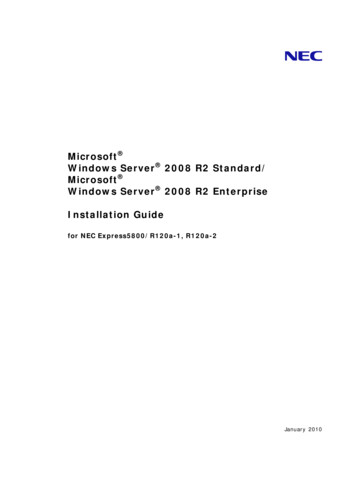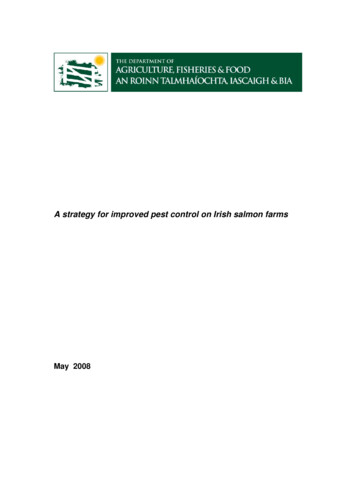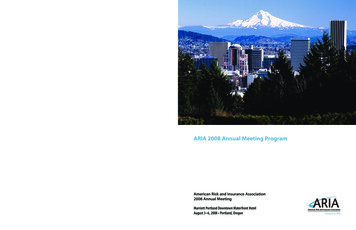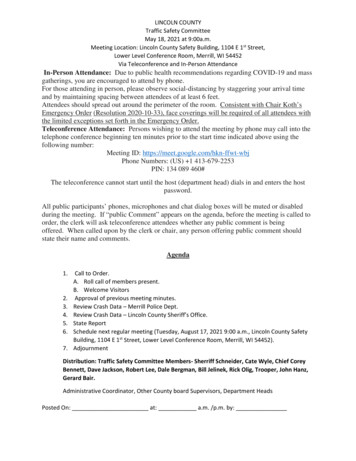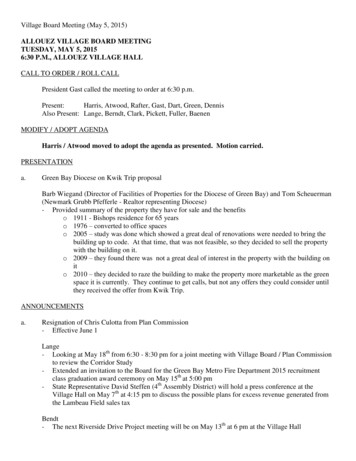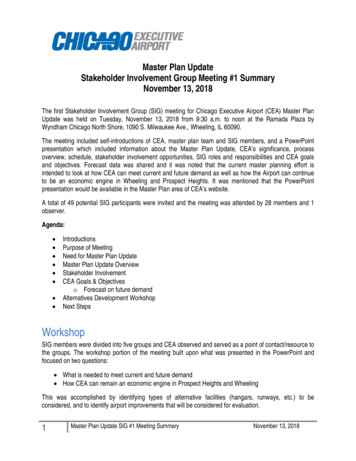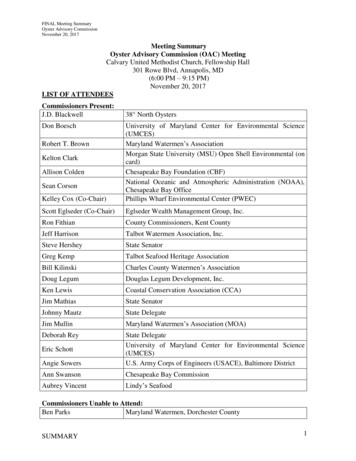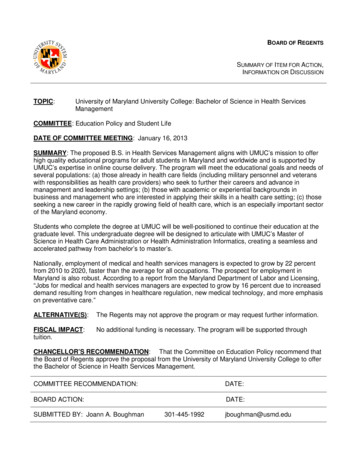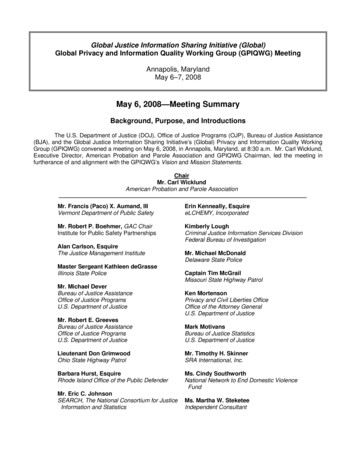
Transcription
Global Justice Information Sharing Initiative (Global)Global Privacy and Information Quality Working Group (GPIQWG) MeetingAnnapolis, MarylandMay 6–7, 2008May 6, 2008—Meeting SummaryBackground, Purpose, and IntroductionsThe U.S. Department of Justice (DOJ), Office of Justice Programs (OJP), Bureau of Justice Assistance(BJA), and the Global Justice Information Sharing Initiative’s (Global) Privacy and Information Quality WorkingGroup (GPIQWG) convened a meeting on May 6, 2008, in Annapolis, Maryland, at 8:30 a.m. Mr. Carl Wicklund,Executive Director, American Probation and Parole Association and GPIQWG Chairman, led the meeting infurtherance of and alignment with the GPIQWG’s Vision and Mission Statements.ChairMr. Carl WicklundAmerican Probation and Parole AssociationMr. Francis (Paco) X. Aumand, IIIVermont Department of Public SafetyErin Kenneally, EsquireeLCHEMY, IncorporatedMr. Robert P. Boehmer, GAC ChairInstitute for Public Safety PartnershipsKimberly LoughCriminal Justice Information Services DivisionFederal Bureau of InvestigationAlan Carlson, EsquireThe Justice Management InstituteMaster Sergeant Kathleen deGrasseIllinois State PoliceMr. Michael DeverBureau of Justice AssistanceOffice of Justice ProgramsU.S. Department of JusticeMr. Michael McDonaldDelaware State PoliceCaptain Tim McGrailMissouri State Highway PatrolKen MortensonPrivacy and Civil Liberties OfficeOffice of the Attorney GeneralU.S. Department of JusticeMr. Robert E. GreevesBureau of Justice AssistanceOffice of Justice ProgramsU.S. Department of JusticeMark MotivansBureau of Justice StatisticsU.S. Department of JusticeLieutenant Don GrimwoodOhio State Highway PatrolMr. Timothy H. SkinnerSRA International, Inc.Barbara Hurst, EsquireRhode Island Office of the Public DefenderMs. Cindy SouthworthNational Network to End Domestic ViolenceFundMr. Eric C. JohnsonSEARCH, The National Consortium for JusticeInformation and StatisticsMs. Martha W. SteketeeIndependent Consultant
GPIQWG Meeting SummaryMay 6–7, 2008Mr. Phil StevensonArizona Criminal Justice CommissionPresenters and ObserversYang Lee, Ph.D.Northeastern UniversityStaffMs. Christina AbernathyInstitute for Intergovernmental ResearchMs. Terri PateInstitute for Intergovernmental ResearchMs. Toby LevinPrivacy OfficeU.S. Department of Homeland SecurityJohn WilsonInstitute for Intergovernmental ResearchMr. David O. SteingraberWisconsin Office of Justice AssistanceRichard Wang, Ph.D.Massachusetts Institute of TechnologyChairman Wicklund announced that the next GPIQWG meeting is scheduled for August 13–14, 2008, inWashington, DC, at the Embassy Suites DC Convention Center. This will be a full meeting of the entireGPIQWG membership without breakout sessions. The two GPIQWG deliverables, the IQ Program Guidebookand the IQ Assessment Questionnaire, are both at a point in development where the final work can be broughtback to the full membership for refinement and final preparation. Today’s and tomorrow’s meetings will hold thefinal breakout sessions for the two task teams. Tomorrow’s agenda will include a third breakout group gatheredfor the purpose of reviewing and soliciting feedback on the Privacy 101 FAQs developed by DOJ’s PrivacyTechnical Assistance Program. Chairman Wicklund requested comments on the January 28–29, 2008, draftmeeting summary. Alan Carlson, the Justice Management Institute (JMI), suggested correcting the title of theNational Council of Juvenile and Family Court Judges referenced in the summary.Chairman Wicklund displayed the published versions of the two new GAC-approved GPIQWG products,Ten Steps to Privacy and Civil Liberties Policy and Privacy and Civil Liberties Policy Development Guide andImplementation Templates:Policy Development Checklist, and thanked the group for its efforts indeveloping these two useful products. He also referred the members to their meeting folders, which containedthe March 2008, Volume 26, Number 1 issue of the Justice Research and Statistics Association (JRSA)Forum featuring GPIQWG member Mr. Phil Stevenson, Arizona Criminal Justice Commission (ACJC).Chairman Wicklund commended Mr. Stevenson on his interview in the forum and asked each GPIQWGmember to contact the Institute for Intergovernmental Research (IIR) if anyone has been interviewed orsubmitted an article to any publication. He also referred attendees to the Global Highlights newsletter, which notonly featured the National Fusion Center Conference, but also included an excellent interview with one of ourmembers The Honorable Anthony Capizzi. This is distributed electronically and is available on the GlobalWeb site, www.it.ojp.gov/global.Global UpdatesGlobal Advisory Committee (GAC) Chairman Mr. Bob Boehmer congratulated Chairman Wicklund forhis election to GAC Vice Chair. He informed the group about the recent GAC bylaw revision to allow non-GACmembers to serve as working group chairs. This change was made particularly to help provide technicalleadership for the technical working groups and also to improve the mechanism for replacing chair positions.Presentations and status reports were provided to the GAC on the National Information Exchange Model(NIEM), the Justice Reference Architecture (JRA), and the Global Federated Identity and Privilege Management(GFIPM) projects. JRA and GFIPM presentations included discussions on how each project was incorporatingGlobal products into its work. The JRA was being used in Utah significantly, and there were pilots beingconducted with GFIPM. Chairman Wicklund added that GFIPM is developing a single sign-on where your nameis associated with your clearance level rather than having multiple passwords and sign-ons for differentsystems. Southern California is working with the Automated Regional Justice Information System (ARJIS), andAlabama is participating in the CONNECT project.Page 2 of 20
GPIQWG Meeting SummaryMay 6–7, 2008Chairman Boehmer discussed the GAC resolution that was adopted to send a message to the AttorneyGeneral (AG) on the importance of Global, its impact and good work, encouraging the AG to continue fundingthe Global program. Global money is closely tied to the Edward Byrne Memorial State and Local LawEnforcement Assistance Grant Program (Byrne Formula Grant Program), which is in jeopardy. If funding is notprovided or located, we anticipate a financial struggle by next spring in order to continue.Mr. Ken Mortensen, Privacy and Civil Liberties Office, Office of the Attorney General, U.S. Departmentof Justice (DOJ), stated that the Deputy Attorney General recognizes the importance and success of Global andis aware that the budget is a big problem. Mr. Michael Dever, Bureau of Justice Assistance (BJA), Office ofJustice Programs (OJP), U.S. Department of Justice, stated that internally BJA is trying to uncover everypossible funding source to help and redirect for Global. For the long term, Global will need appropriationsassistance. A lot of federal programs have assisted in Global products and have implemented Global productsin their programs, such as the Office of the Director of National Intelligence (ODNI), the U.S. Department ofHomeland Security (DHS), the Federal Bureau of Investigation (FBI), and DOJ. We are now seeing moreinterconnectedness between working group deliverables, with privacy being a common topic among all workinggroups and their priorities. Years ago, Global’s priorities were not privacy-related, whereas today privacy is ahot topic. There is now a dependent and complementary relationship among privacy, technology, andintelligence.Chairman Boehmer informed the group that the next Global 101 Training class is scheduled forOctober 22, 2008, held in coordination with the Global Executive Steering Committee (GESC). The next GACmeeting will be on October 23, 2008, and will include GAC elections. He stated that Global outreach is now abig effort, thanks to the work of the newest Global working group the Global Outreach Working Group.Chairman Boehmer stated that he was not aware of many federal advisory committees that hadproduced the number of products that Global has. The number of hours and volunteer service provided bysubject-matter experts (SMEs) to the development of these priorities is significant. Chairman Wicklundemphasized that the GPIQWG privacy work, under Chairman Boehmer’s original GPIQWG leadership, hasdeveloped into a national priority. I believe we will see the same kind of interest and adoption as we begin todistribute the IQ products.Mr. Bob Greeves asked whether there had been further effort to schedule a privacy forum or activity thatall the privacy advocates could attend. Chairman Wicklund said that there had been some discussion aboutcoordinating a forum in which privacy advocates could be invited to a facilitated discussion to express theirconcerns. Mr. Greeves, Mr. Russ Porter (Global Intelligence Working Group Chair), and I have talked aboutputting this together. Unfortunately, there have been so many priorities that it was put on the back burner, but itis on the table and will continue to be something we plan to pull together. It is important to have this dialogue.Mr. Mortenson described a meeting that he and Mr. Alex Joel, ODNI, had with privacy advocates and found veryuseful. They found that the advocates were extremely helpful. There are currently concerns with the AmericanCivil Liberties Union (ACLU) and Virginia’s state fusion center. Mr. Greeves suggested that the media bepresent for such a forum to provide the public with the understanding that this type of discussion is going on.Chairman Boehmer asked Mr. Greeves to talk with BJA to establish a small group to move forward withplanning this event. Ms. Cindy Southworth, National Network to End Domestic Violence Fund, stated that theinitial discussion should be on a national level. We have impressive representatives at this table who are trulyconcerned about privacy. I think we would have the best chance of success if we do a national approach first,rather than a state and local approach. Ms. Southworth requested to be part of this effort.Postmeeting Note: Following this May 6–7, 2008, GPIQWG meeting, a joint collaboration wasestablished to involve the ACLU and other advocates with privacy for fusion centers andsuspicious activity reporting (SAR) for a privacy forum. The joint collaboration is among DOJ,DHS, and ODNI. Funding has been granted to proceed with the privacy and civil libertiesadvocate meeting. This meeting will provide a forum to discuss the privacy controls of theevaluation environment project. It is anticipated that there will be GPIQWG representation onthis team.Page 3 of 20
GPIQWG Meeting SummaryMay 6–7, 2008Working Group Liaison UpdatesGlobal Outreach Working Group (GOWG)Chairman Wicklund referred the group to the Global Highlights newsletter and the executive summaries for eachworking group that were originally prepared for the GAC meeting. The GOWG members have been working onenhancing the Global 101 Training, the design and launch of a new and improved OJP Information Technology(OJP IT) Initiatives Web site (planned to debut as a beta test at the October GAC meeting), and a road map onhow the working groups intersect. The Global road map is envisioned as an online model that will graphicallyillustrate how the various Global pieces fit together the complementary relationship between Initiativedeliverables and activities.Global Intelligence Working Group (GIWG)Mr. Alan Carlson referred the group to the GIWG summary contained within the meeting folders. He talkedabout Mr. Porter’s slideshow, which has been used at the regional intelligence privacy technical assistancesessions, as well as conferences. Mr. Porter is passionate about privacy. The Institute for IntergovernmentalResearch (IIR) has videotaped his presentation and is working on developing a DVD. Other current workincludes a vetting process for the Baseline Capabilities of State and Major Urban Area Fusion Centers;Intelligence-Led Policing Guidelines development; looking at gang intelligence (Gang Intelligence StrategyCommittee); Criminal Intelligence Coordinating Council (CICC) and Major Cities Chiefs Association identificationof promising practices and development of guidelines for suspicious activity reporting; institutionalization of theNational Criminal Intelligence Sharing Plan (NCISP) through the Commission on Accreditation for LawEnforcement Agencies (CALEA); ongoing support to the Interagency Threat Assessment and CoordinationGroup; and a vetting process for the Defining Fusion Center Business Processes: A Tool for Planning.GIWG Privacy CommitteeMr. Paco Aumand stated that the GIWG Privacy Committee has focused on privacy in the fusion centers. Wehave done a wonderful job of focusing on privacy issues on a highly regulated entity, but we are not focusing onan emerging aspect of information sharing records management systems whose information is part ofintegrated justice information sharing. The privacy committee did not meet at the last GIWG meeting. It is,however, working on an agenda for the next meeting. Revisions to 28 CFR Part 23 will be vetted through thiscommittee prior to GIWG and then sent on to the CICC for final approval. One revision to 28 CFR was tochange and lower the reasonable suspicion standard—the standard for entering intelligence information into anydatabase. Mr. Aumand stated that not one law enforcement member, as part of that committee, was forchanging the reasonable suspicion standard.Global Security Working Group (GSWG)Ms. Southworth was unable to attend the April 10, 2008, GSWG meeting but referred the group to the executivebriefing. GSWG is currently working on updating the public release of GFIPM. The status of the justicecredential, GFIPM development activities, and new GFIPM resources are under development. Current andfuture GFIPM projects include the Law Enforcement Information Sharing Program (LEISP)/OneDOJ federatedidentity pilot, DHS Homeland Security Information Network (HSIN) federated identity pilot, Los Angeles CountyGFIPM Pilot Initiative, and GFIPM partnership connecting Los Angeles County Criminal History RepositorySystems and San Diego County’s ARJIS. Possible GFIPM projects may involve CONNECT and fusion centerapplications.Global Infrastructure/Standards Working Group (GISWG)Chairman Wicklund stated that Mr. Scott Fairholm had served as the liaison between GISWG and GPIQWG.Mr. Fairholm has taken a new position and is no longer with the National Center for State Courts (NCSC). Theliaison position remains open, but the efforts of that group are of such a technical nature that we may not have aGPIQWG member who could sit in and participate effectively. We are the least technical of all the groups inGlobal. Current and future GISWG efforts include continued work on the Global JRA deliverables and thetransition to the Services Task Team for the development of high-priority and national shared services. GISWGChairman Tom Clarke, NCSC, also provided a briefing to the GAC on Utah’s Service-Oriented Architecture(SOA) why Utah implemented SOA and how the JRA could have helped.Page 4 of 20
GPIQWG Meeting SummaryMay 6–7, 2008U.S. Department of Homeland Security:Privacy, Civil Rights, and Civil Liberties UpdateMs. Toby Levin, Senior Advisor for DHS’ Privacy Office, provided the group with an update on DHS’Privacy Office activities and on DHS’ Office of Civil Rights and Civil Liberties the two offices in the Office of theSecretary of DHS. Ms. Levin has worked for DHS for three years, having come from the Federal TradeCommission. I have worked with Mr. Mortensen, the former Acting Chief Privacy Officer, for several years, aswell as with Mr. Skinner, who you have as a resource on this group. I have also worked with Ms. Southworth onother initiatives. Ms. Levin commended the group on their work in privacy. “You have produced terrific workproducts. I have begun to be more aware of them in the past couple of months in a project with regard to fusioncenters. I am very interested in your information quality efforts. When this comes out, we will definitely want toreview and hopefully adopt it for our department as well.”The DHS Privacy Office is the first statutorily mandated privacy office in the federal government. Wehave a useful Web site, www.dhs.gov/privacy, which contains a repository of all of our hard work (privacy impactassessments [PIAs], workshops, etc.). As a result of the 9/11 Act, our Office of Civil Rights and Civil Libertieswas tasked with a lot of work to perform training for fusion centers. The assignment of this task is recognitionthat fusion centers do pose privacy issues and also the recognition that through training and policies, we canmake a difference. As a result, we have developed a good working relationship with BJA to help develop thetraining materials for fusion centers and to build on the materials that this group has already developed. Wewant to develop a toolkit to incorporate Global products and others, as well as additional products so that thefusion centers will have the flexibility to use what works for them. Unlike the privacy policy template that fitsacross the spectrum of centers, we thought a toolkit would be value-added to this DHS training effort. DHS isworking through government contracting to coordinate resources through BJA. As part of this project, we wouldlike to explore a way to map the Global Web site with the DHS privacy site and to provide a “train the trainer”model, with additional media filling in the gaps where existing resources may not be sufficient (e.g., in the areaof civil rights). We have already begun training the DHS representatives at fusion centers, having come to learna lot of issues that they are facing. We need to ensure that these representatives have the authority to shareinformation appropriately and to provide guidance. In terms of a timetable, we are behind schedule. Weanticipate six to eight months before we have developed the materials that we would like to provide. As youpoint out, the issues are not unique to fusion centers. We want our materials to be useful in other contexts andother organizations that share information. A current gap is that our training only deals with federal laws andregulations, but the centers also face state statutes and laws that we cannot individually provide training on.Chairman Wicklund asked whether DHS is requiring the fusion centers to have a privacy policy to get federalfunding. DHS guidelines for fusion centers include guidance that they develop privacy policies. Mr. Mortensonfollowed that there is also the Information Sharing Environment (ISE) which, in the ISE Privacy Guidelines,requires fusion centers to have privacy policies to participate in the ISE.Ms. Levin stated that DHS is made up of some 22 components brought together by the HomelandSecurity Act. A number of them have a law enforcement function (Transportation Security Administration [TSA],U.S. Customs and Border Protection [CBP], U.S. Coast Guard, etc.). There are a number of components inintelligence and analysis (I&A) that have inherent privacy issues.The DHS Privacy Office has an important role within DHS. Though it is relatively small (16 full-timeemployees), it is responsible for Freedom of Information Act (FOIA) requests within the department. We havemore than 400 FOIA employees working just on those requests (finding out what the department is doing anddealing with those requests). We try to make sense of what the DHS programs are doing for the public. Weare embedding ourselves into our other programs and have recently received subpoena powers. We are notoperating as an Inspector General (IG) but are helping the programs to incorporate safeguards into theirdepartments to protect privacy at the beginning of projects rather than at the end. We have built operationswithin the department so that we are involved in DHS programs, new DHS projects, and any pr
GPIQWG Meeting Summary May 6–7, 2008 Page 4 of 20 Working Group Liaison Updates Global Outreach Working Group (GOWG) Chairman Wicklund referred the group to the Global Highlights newsletter and the executive summaries for each working
